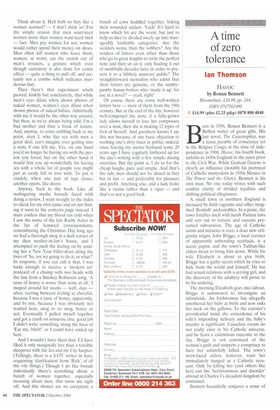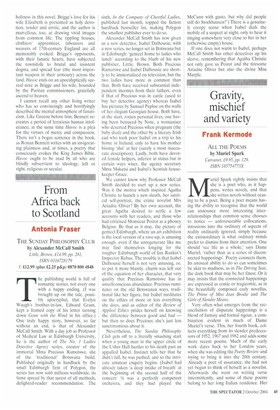A time of zero tolerance
Ian Thomson
HAVOC by Ronan Bennett
Bloomsbuty, .fI6.99, pp. 244, ISBN 0747562490 £14.99 (plus £2.25 p&p) 0870 800 4848
Born in 1956, Ronan Bennett is a Belfast writer of great gifts. His last novel, The Catastrophist, was a tense parable of conscience set in the Belgian Congo at the time of independence in 1960. Havoc, his fourth book, unfolds in 1630s England in the years prior to the Civil War. While Graham Greene is clearly an influence (notably his portrayal of Catholic martyrdom in 1930s Mexico in The Power and the Glory), Bennett is his own man. No one today writes with such sombre clarity of divided loyalties and shifting political allegiances.
A small town in northern England is menaced by Irish vagrants and other imagined `Romish' undesirables. In a panic, the town fortifies itself with harsh Puritan laws and sets out to torture and execute presumed subversives. The age of Catholic saints and miracles is over; a dour new religiosity reigns. John Brigge, a local coroner of apparently unbending rectitude, is a secret papist, and the town's Taliban-like elders mean to bring him down. While his wife Elizabeth is about to give birth, Brigge has a guilty secret which he tries to hide from the world and himself. He has had sexual relations with a serving girl, and the discovery of his adultery will prove to be his undoing.
The morning Elizabeth goes into labour. Brigge is summoned to investigate an infanticide. An Irishwoman has allegedly smothered her baby at birth and now risks her neck on the gallows. To the coroner's providential mind, the coincidence of his wife's impending delivery and the baby's murder is significant. Causeless events do not really exist in his Catholic universe, and he fears a calamitous outcome to the day. Brigge is not convinced of the woman's guilt and suspects a conspiracy to have her unlawfully killed. The town's stern-faced elders, however, want her immediately hanged as a Catholic recusant. Only by killing her (and others like her) can the 'licentiousness and disorder' abroad in Charles I's decadent kingdom be contained.
Bennett beautifully conjures a sense of holiness in this novel. Brigge's love for his wife Elizabeth is presented as holy devotion, tender and erotic, and the author is marvellous, too, at drawing vivid images from common life. The tippling houses, clothiers' apprentices, labourers and weavers of 17th-century England are all memorably evoked. Brigge's opponents, with their fanatic hearts, have subjected the townsfolk to brutal and insistent dogma, and spread fear (the most important weapon in their armoury) across the land. Havoc ends on an apocalyptically surreal note as Brigge and his wife, hounded by the Puritan commissioners, gratefully ascend to heaven.
I cannot recall any other living writer who has so convincingly and horrifyingly described the mental atmosphere of fanaticism. Like Greene before him, Bennett recreates a period of ferocious human intolerance; at the same time Havoc is a plea for the virtues of mercy and compassion. There isn't a bogus sentence in the book, as Ronan Bennett writes with an invigorating plainness and, at times, a poetry that consciously evokes the King James Bible. Havoc ought to be read by all who are blindly subservient to ideology, left or right, religious or secular.



















































































 Previous page
Previous page